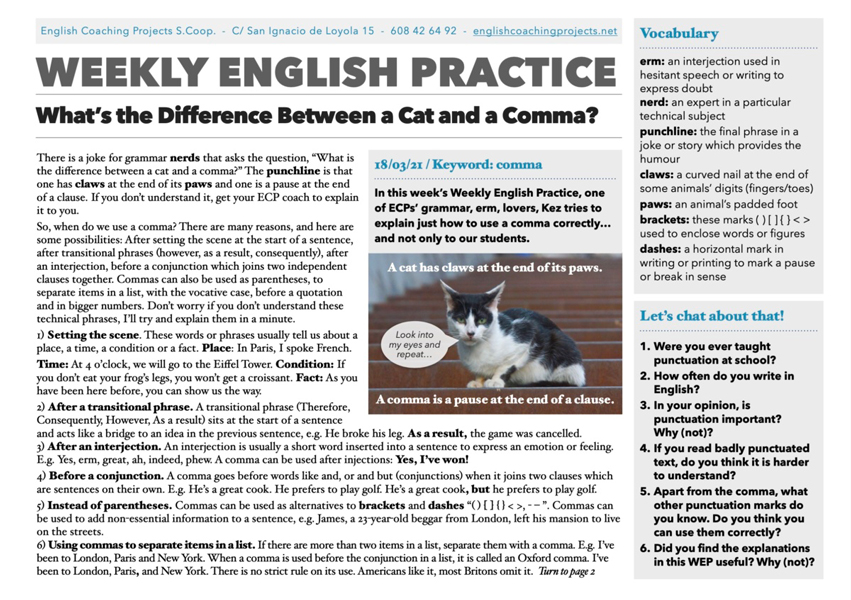What’s the Difference Between a Cat and a Comma?
18/03/21 / Keyword: comma
In this week’s Weekly English Practice, one of ECPs’ grammar, erm, lovers, Kez tries to explain just how to use a comma correctly… and not only to our students.
Click HERE to download the Weekly English Practice as a PDF.
Useful vocabulary
erm: an interjection used in hesitant speech or writing to express doubt
nerd: an expert in a particular technical subject
punchline: the final phrase in a joke or story which provides the humour
claws: a curved nail at the end of some animals’ digits (fingers/toes)
paws: an animal’s padded foot
brackets: these marks ( ) [ ] { } < > used to enclose words or figures
dashes: a horizontal mark in writing or printing to mark a pause or break in sense
Listen to the audio and read the text (refresh the page if it’s not visible).
In this week’s Weekly English Practice, one of ECPs’ grammar, erm, lovers, Kez tries to explain just how to use a comma correctly… and not only to our students.
There is a joke for grammar nerds that asks the question, “What is the difference between a cat and a comma?” The punchline is that one has claws at the end of its paws and one is a pause at the end of a clause. If you don’t understand it, get your ECP coach to explain it to you.
So, when do we use a comma? There are many reasons, and here are some possibilities: After setting the scene at the start of a sentence, after transitional phrases (however, as a result, consequently), after an interjection, before a conjunction which joins two independent clauses together. Commas can also be used as parentheses, to separate items in a list, with the vocative case, before a quotation and in bigger numbers. Don’t worry if you don’t understand these technical phrases, I’ll try and explain them in a minute.
1) Setting the scene. These words or phrases usually tell us about a place, a time, a condition or a fact.
Place: In Paris, I spoke French.
Time: At 4 o’clock, we will go to the Eiffel Tower.
Condition: If you don’t eat your frog’s legs, you won’t get a croissant.
Fact: As you have been here before, you can show us the way.
2) After a transitional phrase. A transitional phrase (Therefore, Consequently, However, As a result) sits at the start of a sentence and acts like a bridge to an idea in the previous sentence, e.g. He broke his leg. As a result, the game was cancelled.
3) After an interjection. An interjection is usually a short word inserted into a sentence to express an emotion or feeling. E.g. Yes, erm, great, ah, indeed, phew. A comma can be used after injections: Yes, I’ve won!
4) Before a conjunction. A comma goes before words like and, or and but (conjunctions) when it joins two clauses which are sentences on their own. E.g. He’s a great cook. He prefers to play golf. He’s a great cook, but he prefers to play golf.
5) Instead of parentheses. Commas can be used as alternatives to brackets and dashes “( ) [ ] { } < >, – – ”. Commas can be used to add non-essential information to a sentence, e.g. James, a 23-year-old beggar from London, left his mansion to live on the streets.
6) Using commas to separate items in a list. If there are more than two items in a list, separate them with a comma. E.g. I’ve been to London, Paris and New York. When a comma is used before the conjunction in a list, it is called an Oxford comma. I’ve been to London, Paris, and New York. There is no strict rule on its use. Americans like it, most Britons omit it.
7) Commas before a quotation. Commas can be used to introduce a quotation. E.g. The dinner lady said, “It’s too wet to play outside.”
8) The vocative case. When addressing someone directly, you should separate the name being used (e.g. John, Mary, my darling, my son) from the rest of the sentence by using a comma. For example: Rebecca, put your hand up if you don’t understand.
9) Commas with numbers. Commas can be used every 3 decimal places with large numbers to make them more readable.
3,356 / 12,128,153,356 / 175,757.01
There are also other reasons to use commas that I haven’t included in this article. If you’re still unsure of how to use commas, don’t be afraid to use the internet to find out, or you can put your ECP coach to the test by asking them!
Adapted from grammar-monster.com by ECP coach Kez Kurien.
Let’s chat about how to use a comma!
- Were you ever taught punctuation at school?
- How often do you write in English?
- In your opinion, is punctuation important?
Why (not)? - If you read badly punctuated text, do you think it is harder to understand?
- Apart from the comma, what other punctuation marks do you know. Do you think you can use them correctly?
- Did you find the explanations in this WEP useful? Why (not)?
Take a moment to look at these related articles!
Reading to learn is no walk in the park
Bot tries to write Harry Potter book and fails in magic ways

